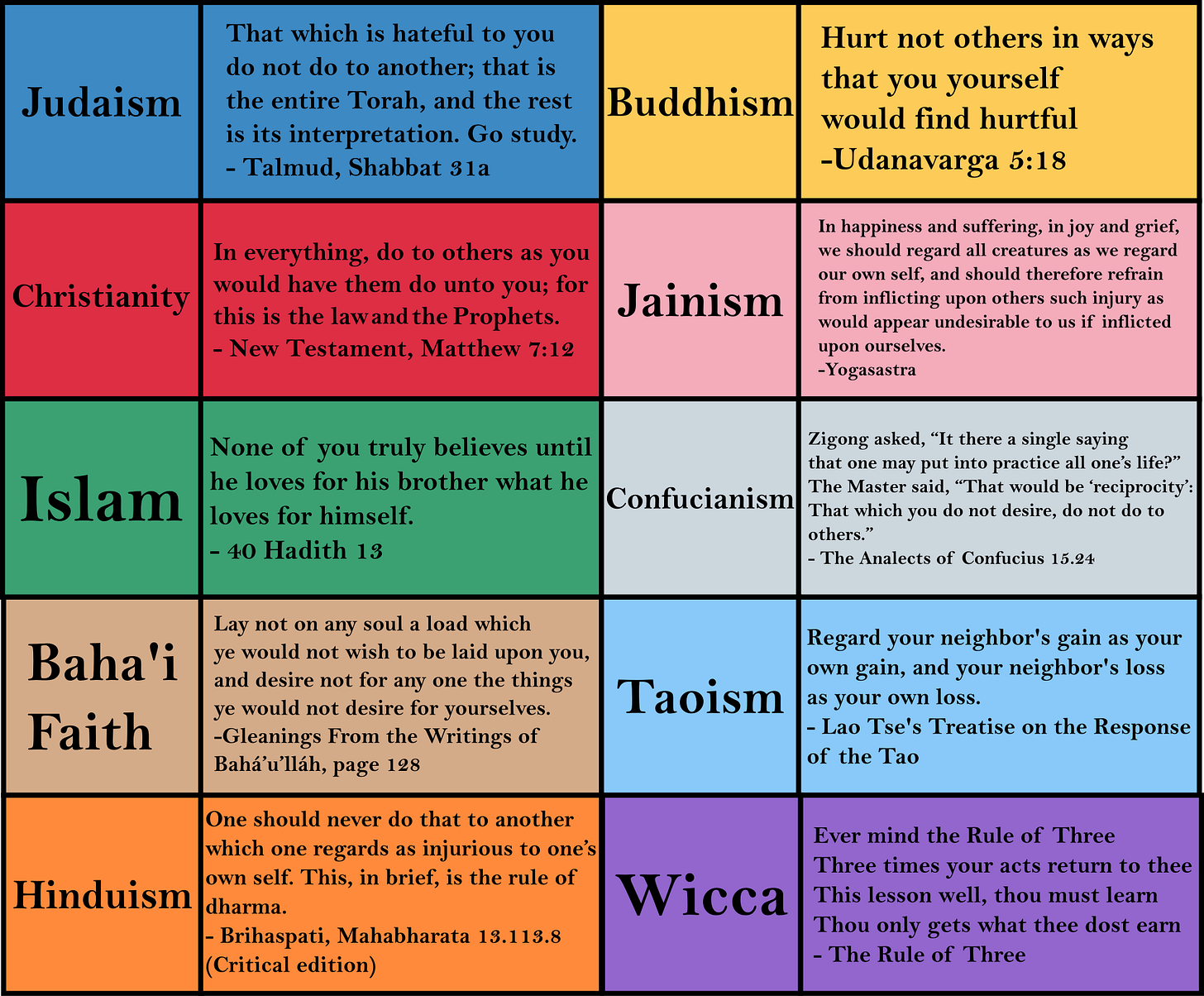I have a rule about not eating at night. It’s a common rule many people have. I can have dessert after dinner if I want, but after that, no more calories until breakfast. This works great until… I get hungry! Or I remember there are chocolate covered Oreos in the pantry! Then my mind defiantly says, “Rules? What Rules?”
This is the challenge. Having a rule is easy, but following it is something else altogether. It’s almost like we have two different minds: one that likes rules and one that hates them. And they don’t talk to each other very often.
Yesterday I was reading through the excellent Wikipedia article on the Golden Rule. Among it’s many gems is a chart showing how the core idea of “do unto others” is reflected in almost every major religion. (I promise again this book isn’t focused on religion, it’s just hard to study the history of rules to live by without spending some time here).
Do you see a problem with the chart below? Can you think of any wars from history, or the present, with two or more of these groups involved? Assuming no one wants to die, anyone with these affiliations breaks the golden rule every time they go to war. The wise religion expert Karen Armstrong argues that religion doesn’t start most wars, but it can be a way to rally people to take sides. Either way the golden rule doesn’t hold up so great in practice when you look at the history.
Some theologians argue that for some religions these rules were meant to apply to fellow followers. They were never intended to be a universal ethical standard at the time they were written. There’s also the savior complex problem, where I presume I know what is best for you, as I invade your country, take your land and forcefully convert you to my belief system and culture. Golden for sure, right?
Maybe some rules can’t scale well. What rules do we actually follow as a civilization? A nation? A town? A family? A person over their lifetime? These are good questions for another day.
Upgrade to the platinum rule?
The idea of improving on the golden rule into what’s called the platinum rule comes from different sources. One of them is a hero of mine, Karl Popper. Decades ago he wrote:
“The golden rule is a good standard which is further improved by doing unto others, wherever reasonable, as they want to be done by.”
Years earlier, George Bernard Shaw wrote:
“Do not do unto others as you would that they should do unto you. Their tastes may not be the same.”
These better rules have been around for a long time, but the premacy of the problematic golden rule remains. Why is it so slow for culture to upgrade it’s basic rules?
But the big joke is that the term platinum rule is claimed by several different people. Yes, that’s right. People claiming to have come up with the term don’t seem to be treating others the way they want to be treated. Somehow Kenji Yoshino and David Glasgow, authors of Say The Right Thing, and Tony Alessandra, author of the Platinum Rule, all claim to have coined the term. It seems even people who come up with rules struggle to follow them too.
Can rules give us integrity?
As the fighting over the term platinum rule suggests, we have problems with hypocrisy and integrity. How do we keep ourselves honest? Isn’t the core motivation to have a rule to limit behavior we know we desire in some ways, as my midnight Oreo temptations suggest?
Integrity often requires sacrifice. Only when we are tested or tempted is our real character decided. When it doesn’t cost us anything, it’s easy to follow a rule. It’s a kind of virtue signaling to others and ourselves. Look at all the great rules I have!
This is why books on habits suggest meta-habits, like never keeping chocolate covered Oreos in the home so there is no temptation at night. Then the rule making part of our mind is working to help the rule breaking part instead of pretending it doesn’t exist. Cheat days are another excellent, self-aware meta-rule.
It’s only when our rules are tested that our tough choices define the real rules we live by, even if we are unaware of they are. Which suggests when creating a new rule, we need to intentionally test it. Otherwise it’s not a rule, but a wish.
If you liked this, please share it. The more folks I can get to help with this project the better. Thanks.





I was somehow not aware of the platinum rule. Thanks for introducing it.
Treating others as they wish to be treated seems like a good way to avoid cultural misunderstandings and serious faux pas.
That said, I think the cynical version of the golden rule is more apt at explaining longer term human & societal behavior, ie, those who have the gold make the rules.
"Why is it so slow for culture to upgrade it’s basic rules?" I don't know, we can't even correct the equation for BMI to account for the world being 3D, even if it misinforms people about their health and breaks epidemiological studies. I'm not even talking about fat/muscle content etc. I sympathize with the struggle against an evening sweets monster, he visits me too.